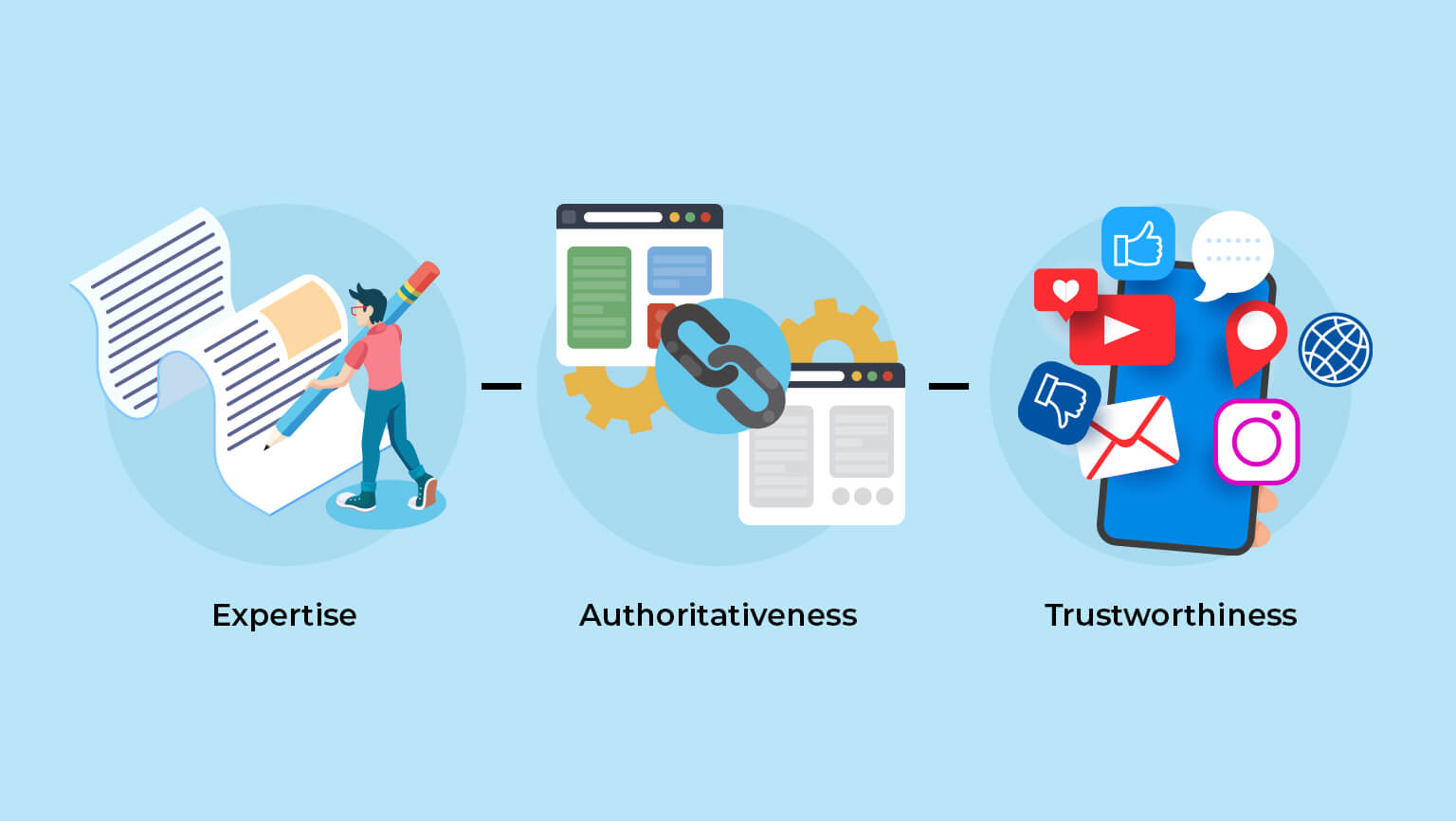No, we’re not talking about E-A-T in the “nom, nom, nom” sense.
This is an acronym that has been thrown around the SEO world quite a bit in recent years. More specifically, we see experts give their hot take on the matter after a big Google Core Update.
Like most things related to Google’s famously mysterious ranking algorithms, the concept of E-A-T has become one of the vaguest terms in the SEO world.
Even if you understand what E-A-T stands for, do you know how it affects your SEO-optimized content? If you’ve read many theories, do you know how they directly impact your website?
In this article, we want to talk about a few things, including what E-A-T truly is, how it impacts you directly, and how you can use the concept to rank better organically on search engines.
What Is E-A-T?
Expertise – Authoritativeness – Trustworthiness.
Three simple words, and yet the concept of E-A-T has become so much more than just three words strung together. Let’s take a deep dive into each of the three aspects of this concept to give you a stronger understanding of how they work together.
Expertise
If there’s one thing Google loves, it’s a real expert producing content.
The search engine has been working diligently over the years to rank expert content higher than blogs or posts written by non-experts. Not only does this provide better search results for users, but it also ensures that the top results on Google are almost always written by people who know what they’re talking about.
The question is, how can you show Google that you’re an expert?
In all honesty, the answer to this query depends on your industry. Let’s say you’re researching symptoms of the flu. In this case, you’d be happy to see that the top results are written by Mayo Clinic and the CDC, not some random parent blogger.
However, not all “experts” are as clearly defined as medical professionals. When it comes to more ambiguous topics like self-betterment, fashion, travel, holistic health, and other industries, you need to do more work to highlight your expertise to Google.
A few tips for making your expertise evident to all search engines include:
- Making your credentials clear on your website, social media profiles, and all bios.
- Publishing research or case studies in your name, not just simple blog posts.
- Citing and working with credible, well-known institutions within your content.
Authoritativeness
People often confuse expertise with authoritativeness. Expertise refers to how you present yourself. Authority, on the flip side, relates to how other people on the web perceive you.
The difficult part about building online authority is that it can’t just come from you. Google will determine how authoritative a website is based largely on how many relevant, high-quality backlinks and mentions you or your site has.
If you have very few endorsements for your expertise, Google probably won’t view your site as highly authoritative.
So, how can you build authoritativeness if you need others to provide it for you? The answer (we believe) lies in the following strategies:
- Link building. Google loves to see that other authoritative, respected websites have linked to yours. Work on forging connections with other websites to get your link (and name) out there.
- Direct mentions. The more experts in your industry reference your website or brand name, the more authority your site will ideally have. Use a tool like Buzzsumo or Brandwatch to monitor when people mention you online.
- Shares. If people are frequently sharing your content across networks, Google will view the shares as an indication of high authority.
Keep in mind that it takes time to build authoritativeness. You can claim your expertise quickly, but the process of establishing your place amongst other experts and earning respect never ends.
Trustworthiness
When it comes to trust, it’s distrust that can seriously kill your rankings.
You could have expert credentials and a bunch of awesome brand mentions, but if customer sentiment reveals that your site isn’t reliable or accessible, your trustworthiness score can bring everything crashing down.
In terms of the content itself – if you make a bold claim that goes against widely accepted scientific evidence, your trustworthiness is likely going to take a hit. Think about the famous people who recently attested that the Earth is flat…
Additionally, there shouldn’t be a notion that your website/business scams people or provides subpar results. That’s where reviews come into play. Google uses reviews on high-authority platforms to confirm that a site has honest practices and genuine value to provide searchers.
A few of the best places to establish a review presence include:
- Better Business Bureau
- Google My Business
- Trustpilot
- TripAdvisor
- Yelp
Additionally, your site must be easily accessible and user-friendly to be considered “trustworthy”. Make sure that your contact information, your business’ physical address, and your terms and conditions are easy to find.
You should also have proof that your site is HTTPS secured, as well as a visible privacy policy and a method of handling any e-commerce transactions securely. Otherwise, Google might not see your checkout process as 100 percent safe.
What Industries Does E-A-T Impact the Most?
After a major Google Core Update, many industries begin to buzz about how E-A-T impacts their website rankings. However, few industries appear to be as impacted as YMYL (Your Money Your Life) brands and bloggers.
YMYL industries involve areas like health, law, finance, self-betterment, and so on.
Why does Google treat these industries differently?
Well, unreliable content related to health finance, law, etc. can be potentially dangerous. And in some cases, life-ruining.
For those of you who know me personally, you probably know that I’m on the keto diet.
Before I started, I did lots of Googling and read a ton of blogs to learn more about it. As this diet plays a significant role in my everyday life, I didn’t want to see keto-related content written by any joe schmo. The author of the post needs to make it clear that they actually know what they’re talking about!
Think of it this way.
Say you want to learn more about stock investing. You’re handed two books on the subject; one was written by Warren Buffett and the other was written by some random dude you’ve never heard of. Based on this alone, which book would you take?
You can’t just slap a degree on the website and call your expertise defined. Instead, you’ll need to actively work within your industry to highlight your expertise, receive acknowledgments from others, and generally convince Google of your reputation and credibility.
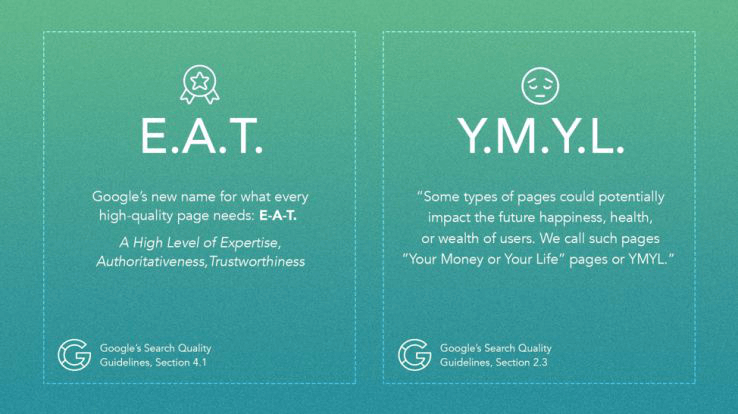
Google doesn’t want to throw around information that’s potentially inaccurate or unsupported, so it goes above and beyond to confirm the expertise and authority of YMYL brands and writers.
How Does E-A-T Factor Into Different Types of Pages?
Blog Posts
As of July 2018, Google announced that it wouldn’t just review the E-A-T of websites, but also that of the content creators, too. Therefore, if you want to convince Google that your blog posts are written by experts with proper credentials, you need to tell the search engine.
You need author boxes or links to author profiles on any blogs or articles posted on your site. This will give Google the information it needs to connect the author to signs of authority and expertise.
While nothing is ever certain with Google, is it possible that the algorithms recognize an author, then run a scan of the web/publically available data (like education credentials and published work) to determine expertise?
Absolutely!

As a rule of thumb, any author profile should include the full name of who has written the content and any important credentials that are relevant to the topic.
Service Pages
When you list the services that your company provides, you don’t want to just put them on the website – you need to indicate that you have experience with the services and evidence of high-quality work.
Ways to indicate expertise, authoritativeness, and trustworthiness on a service page include:
- Pulling testimonials from real customers that have purchased the services
- Easy access to contact info, as well as terms and conditions page.
- Listing experience and any relevant credentials
- Providing case studies that reveal the success of your services
Product Pages
In the world of e-commerce, there will (probably) always be the pain point that you don’t get to see/touch the product before buying it. That said, improving the E-A-T of your product pages needs to focus on giving customers as much information as possible to alleviate this struggle.
I Googled the term “best hiking poles” and this product page was one of the top results. Take a look:
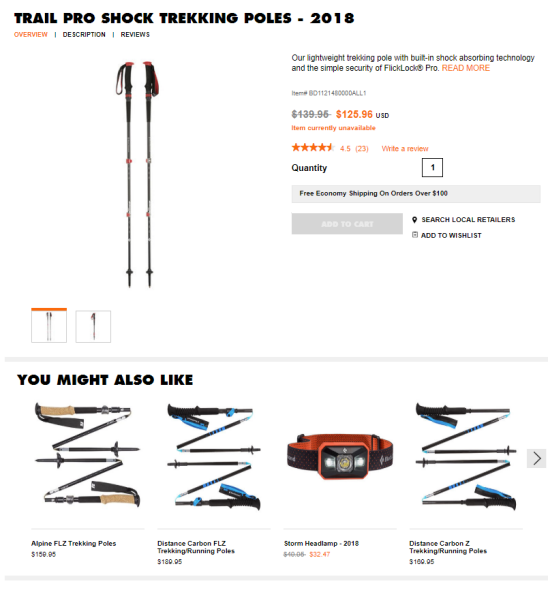
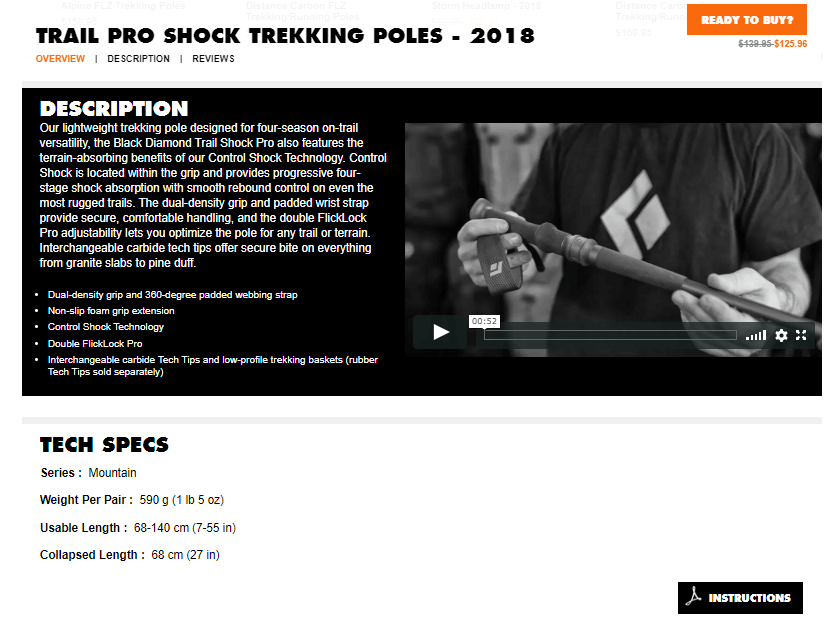
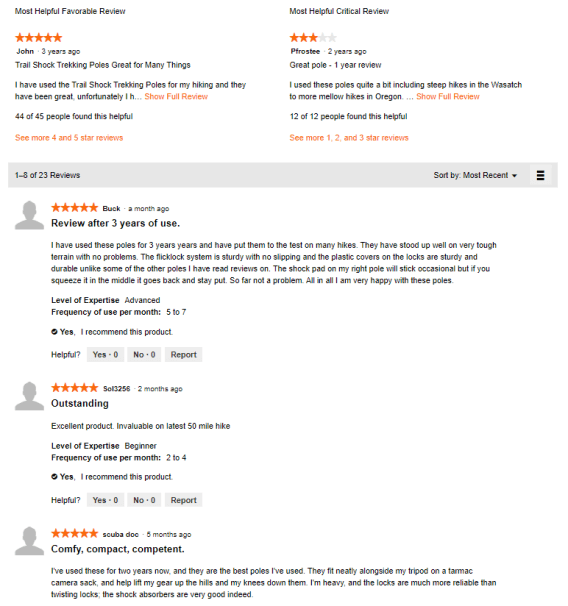
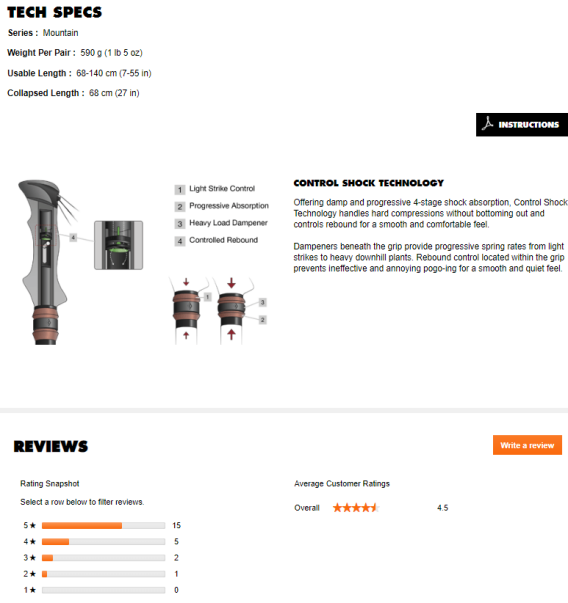
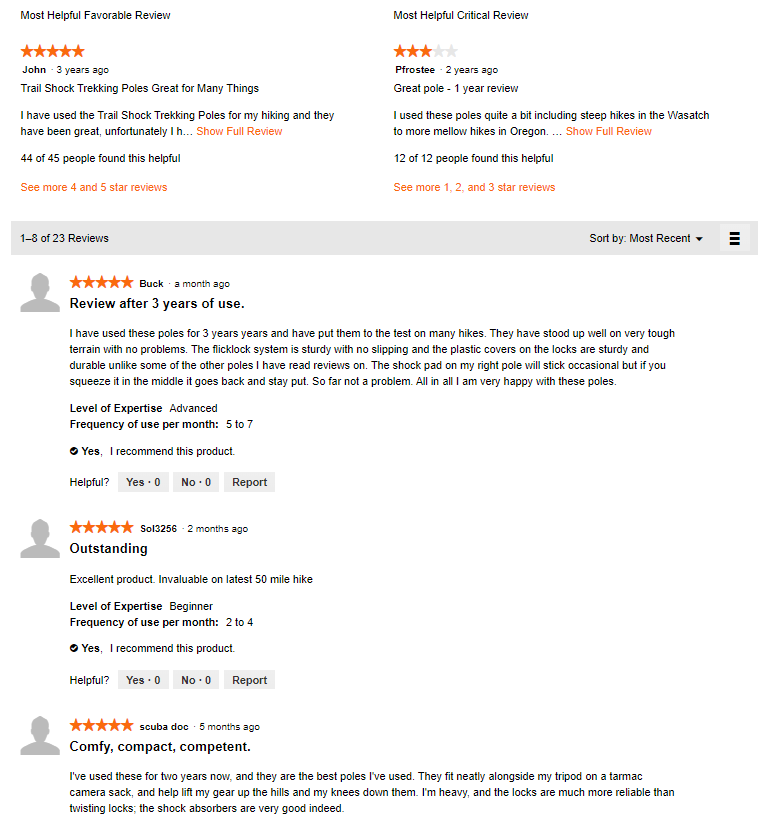
Sorry, there’s a lot of information on it….
The reason this product page performs so well is because it has just about everything a potential customer might want.
- Plenty of images
- Good descriptions
- A product video
- Technical specs
- Reviews
- Related product recommendations
This is the gold standard of product pages. When you create yours, you need to think like a customer. What information would you want to be confident in your purchase?
How Can You Gauge the E-A-T of Your Webpages?
Now that you understand what E-A-T refers to, you need to assess your own website to make sure it checks all of the boxes. Let’s break down this assessment into a few categories of queries you can ask (and answer) yourself.
On August 1st of this year, Google released a Core Update Guidance, penned by Danny Sullivan.
When assessing your content, Sullivan outline four distinct “Questions Areas” to gauge its viability:
- Content and Quality Questions
- Expertise Questions
- Presentation and Production Questions
- Comparison Questions
Content and Quality Questions
Let’s start by assessing the quality of the content your website produces.
In order for your content to be considered expert, authoritative, and trustworthy, it must be easy to understand and thorough. It should also provide new ideas that haven’t been previously said, as well as answers to pressing questions and credible, timely data.
So, as you evaluate your content, ask yourself the following questions to determine if your content is up to par:
- Can my readers easily understand and learn from my content?
- Does my content provide BOTH sides of the story?
- Have I thoroughly and completely explained the concepts I’m discussing?
- Is my content new and original, or simply a common concept that’s been regurgitated?
- Have I used visual tools and imagery to add to my points, not distract?
- Do I have proof that I used credible sources and data that’s recent?
- What questions am I actually answering with my content?
Expertise Questions
You might have presented your credentials in your bio, but have you really done all you can to reveal your expertise to Google and readers? Ask yourself the following questions to see if you can do more.
- Have I shown why the authors of different blog posts on my website are qualified in the industry?
- Can Google quickly and easily identify the credentials of content producers on my website?
- Have I eliminated all factual errors and gray areas?
Presentation and Production Questions
Even if you’re a proven expert and your content is fantastic, if your site doesn’t look/function respectably, then you won’t excel with E-A-T. Here are some questions to ask yourself in regard to the more technical aspects of your site.
- Does my website load quickly?
- Could my design be updated more?
- Does the website respond properly to users?
- Have I eliminated all broken links?
- Are all of the interactive components working as they should?
- Is everything free of stylistics, spelling, or grammatical errors?
Comparison Questions
Now it’s time to be as critical and objective about your own content as possible. These are the hardest questions to ask yourself, but they’re very important when it comes to determining how your site holds up to its competitors.
- Does my website provide substantial, measurable value to users in comparison to other content?
- What does the first impression of my content look like? Is it better or worse than others?
- Am I really writing for users, or am I just trying to rank highly on Google?
It’s always tough to answer questions about your own site. If you can, try to run a focus group. Show someone three-four websites and ask which one they would spend money with and why.
In Conclusion
Understanding E-A-T isn’t just about reading theories and paying attention to Google updates. In order to maximize the success of your SEO, you need to think about how all of your pages are working together to create a source of expertise, authoritativeness, and trustworthiness.
Google has millions of pages to sort through for every search result it pulls. If you want yours to rank on that prestigious first page, then you need to give the search engine every reason to trust and highlight your site, as well as your content creators.
Jack Shepler is a Marketing and Search Engine Optimization expert. He founded Ayokay, award-winning marketing, and web design firm in Indianapolis, Indiana that has built brands, increased sales for businesses, and helped nonprofit organizations fulfill their missions since 2011. He uses his decades of experience to educate through the Ayokay blog and through public speaking. You can follow him on LinkedIn.

